G77 Summit Draws World Attention to Realities, Hopes of “Average Cubans”
By hosting the G77 Summit this month, Cuba renewed discussions about its contribution to technological innovations on the world stage at a time when diplomacy and international cooperation hold the keys to solving pressing global challenges,. But how do “average” Cubans regard their personal agency in international relations? For volunteers working with Cubans participating in Global Volunteers’ projects in Havana and Ciego de Avila, the G77 Summit also raises the importance of English language proficiency in improving the Cuban people’s future. We checked in with some local Cubans and recent volunteers to learn more.
Cuba’s hosting of the G77 Summit on September 15-16 was a significant diplomatic achievement, underscoring the country’s ability to maintain ties with a diverse range of nations. But Cuba remains beset with serious economic and political problems. Because the benefits of such a prestigious, high-level event may be distant from those who struggle to earn a living to afford even basic necessities, Americans wonder how they can best help their Cuban neighbors. In offering English conversations and tutoring, assistance with labor projects and a hand of friendship, our Cuban friends say Global Volunteers helps them gain an advantage in business and other important ways. They eagerly shared candid opinions:
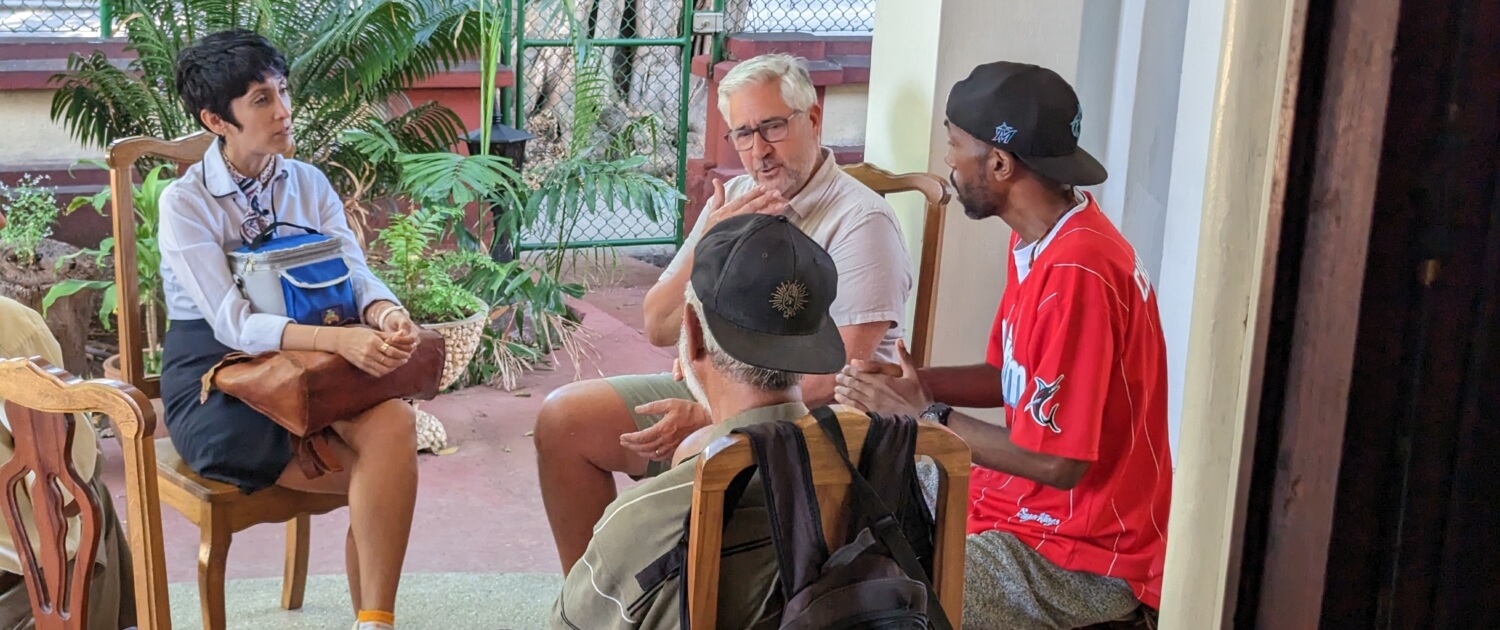
Selene Fundora, mother of two teens, has worked as the director’s assistant of a Havana international health clinic for 23 years. She’s studied English independently and in private classes to sustain her proficiency. She says she greatly appreciates practicing English with Global Volunteers because the lessons are free and the volunteers are very patient and engaging.
“For me, Global Volunteers brings light and love,” she say. You help us with English, which is an important key in our lives. But more, you bring us hope, love, faith and light to the people who are in the dark. It’s a privilege to have you with us to share your knowledge, experience, care, love and support. Over time, you become part of our family. We accept and love you. It’s unforgettable.”
In reflecting on how international assemblies such as the G77 Summit helps spotlight Cuba’s opportunities and challenges, she says: “I deeply wish for my country to keep hope alive. I dream for a more organized Cuba, a cleaner Cuba, a happier Cuba, and for all Cubans to work together to build the country we want. This is what I’ve learned from Americans I’ve met. That nothing is impossible in this world, no matter what is against your goal. You can fight for your dream. For example, coming to Cuba seems impossible for some Americans. But, they find a way to come and know us and our country. Thank you for giving , and help them to becoming in better persons. I appreciate so much your labor in building a better society to all the human beings!”
Roig Ramirez, a student at Pedagogical University of Ciego de Ávila, is studying to become an English teacher. He said he counts on volunteers to come to his community to help emphasize the importance of English in Cubans’ lives.
“Global Volunteers’ tutoring program is a unique opportunity for people like me, who want to improve language skills. We have great teachers in our schools who make great efforts to provide good education, but in terms of language learning, sometimes this is not enough,” Rojg asserts. “There is nothing like the opportunity of not only talking but interacting with native English speaking persons. I not only learn and improve my abilities in these sessions, but also have the opportunity to get to know more about cultural and historical aspects of the United States. This is vital for someone who will have to teach the language in the future. For me, Global Volunteers is a remarkable opportunity which I am very grateful for.”

The Language of Opportunity
Retired English professor Oswaldo Monteagudo contends that English unites people in global understanding and respect. “When you can speak a common language, you can get past barriers that impede understanding. English has become that global language of unity. So, for me, English has been critically important in my life – since I was a young student. I love the language. And, I love speaking with every American and every volunteer who comes to work with us. We find our commonalities and all the challenges dissolve.”
“That’s why Global Volunteers has been a blessing for all of us,” he continues. “You represent sharing, understanding, uniqueness, relationship, blessing and so much more. You are bridges which, for the time being, technology hasn’t achieved yet. Cuba has never been a terrorist nation, but is depicted as such. In solidarity, the Cuban and American people can extend love around the world. We Cubans admire the American people, although not some politicians. The G77 was between our political leaders. Global Volunteers is between citizens of the world.” Then, he added: “It’s the citizenry who will save our wonderful planet. Our lives together are at stake. We’re in the same ship. That is what our Cuban president stated at the assembly on behalf of all the nations. And, of course, it’s true.”
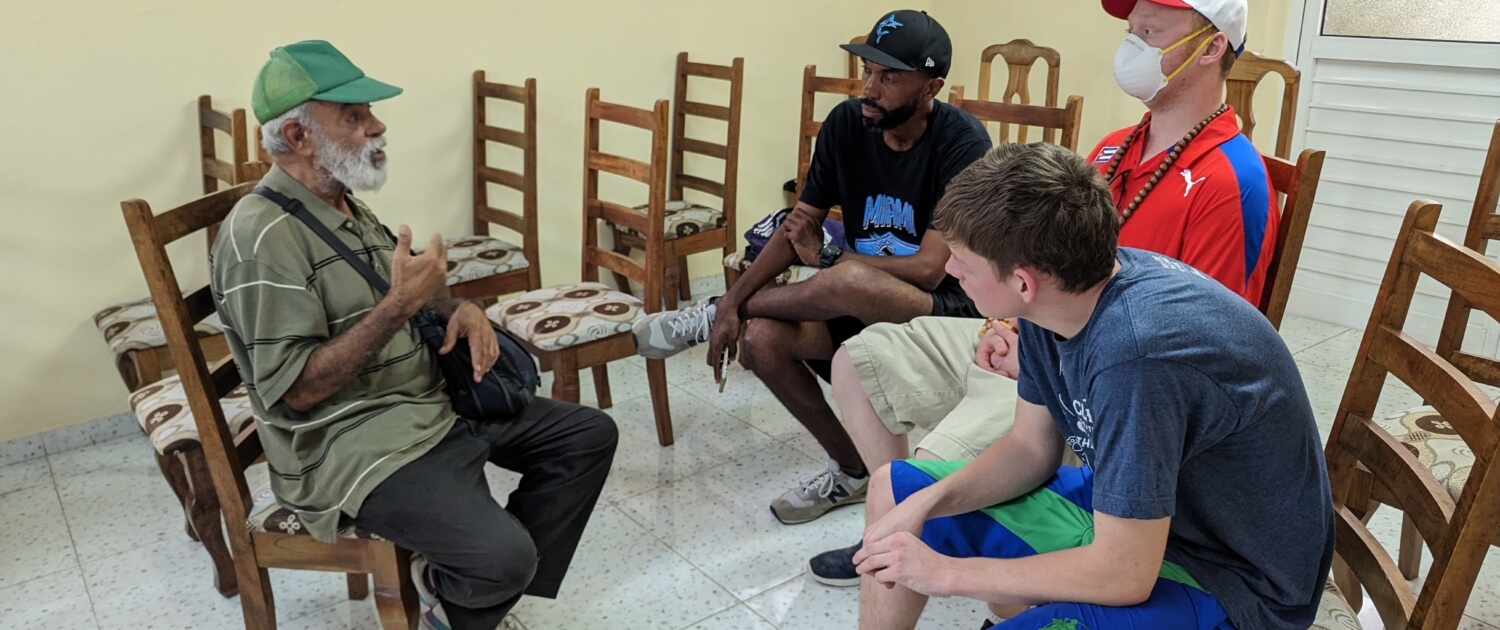
Volunteers serving in Cuba also are introduced to the debilitating realities of life under Communism – the lack of resources, opportunities and a living wage.
A doctor earning 4,000 Cuban pesos ($166) a month tries to purchase 30 eggs – a simple protein – for $14. In his hospital, there are no swabs or alcohol for surgical procedures. Patients plead for medicine on What’s App. “We’re trying our best to live a decent life. But, it’s impossible,” he says.
A father of four works three jobs, nearly round the clock, and waits in line for six hours to purchase a ham. “Children go without milk, without meat. If you’re a single mother, for instance, living with two boys and earning maybe 5,000 Cuban pesos (less than $200), you can’t imagine how to survive.”
For them, the lofty dealings of international leaders has no impact, and imparts a cruel irony. “The world sees lavish meals and luxury for show,” says one disillusioned student. “But, we get broken cars and broken promises.”
“Teaching conversational English to Cubans was extremely rewarding. Many students were interested in speaking English better or beginning the process of learning. The infusion into the community and working with the local people in an informal way allowed me to share information about the US and learn firsthand about day-to-day life in Cuba.”
Cuba Alumni Volunteer Patricia Harper.
For restless or ambitious Cubans, English can truly be a passport out of poverty. For those who have relatives or friends to sponsor them in another country, the lure of a good job – usually requiring English and an advanced educational degree – is irresistible. “Young people, especially are leaving,” said a father participating in Global Volunteers’ conversational English lessons. “In two months, thousands have gone. But, because of my children, I stay here and try to make a life.”
Helping Cubans of all ages make a life is the focus of every Global Volunteers team, and takes several forms. We support teens and adults in conversational English lessons in community centers, churches, homes for elders, and women’s co-ops throughout the year. Volunteers also work alongside local people on general labor projects and gardening, assist with sewing, crafting, or knitting, and engage seniors in games, music, conversation, and physical therapy. Volunteers have the opportunity to explore and learn more about the history and the culture of Cuba during educational activities after the work day and on the weekend. Volunteers are eager to reflect on their unique and meaningful service:
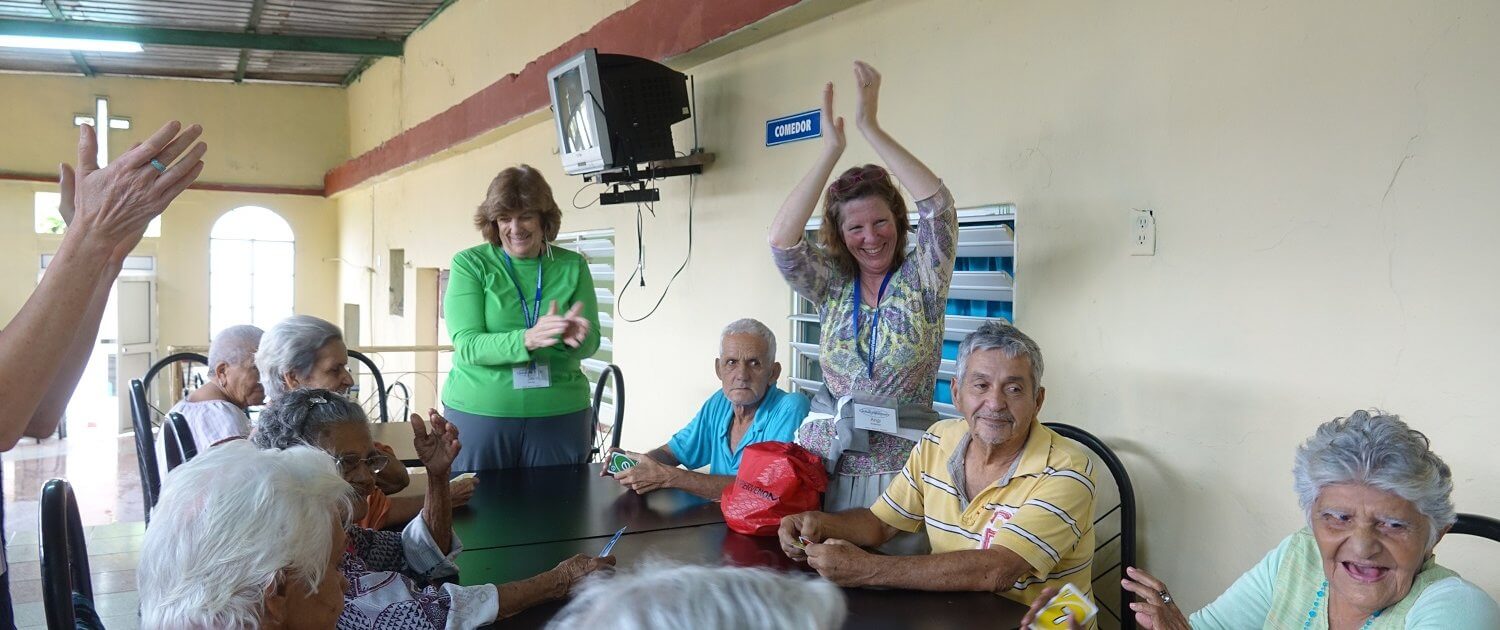
“My primary service assignment was working at the Salvation Army nursing home,” offered two-time volunteer, Angi Anderson. “The seniors were lovely and the staff so kind. Hand massages, manicures, and games of UNO were effective in bridging the gap in communication but we did it with love and it was fun!”
Community Development Support
A foundational principle of Global Volunteers is to support local people’s self-determination, capacity building and vision for the future. Every partner community invites us to work hand-in-hand with local people on improvements they’ve identified are important to their long-term development.
Throughout the island, community gardens supply produce for preschools, senior centers and markets for local residents. Volunteers help plant, weed, and harvest fruits and vegetables with farmers in Ciego de Ávila who maintain the gardens on behalf of their community. Further, most buildings require repair and maintenance. The American trade embargo has deprived Cubans of resources, and lack of materials makes repair and maintenance extremely difficult. Volunteers help update and improve community buildings by scraping, sanding, and painting, and provide plumbing, carpentry, and electrical maintenance assistance. Volunteers are also needed to assist with the ongoing construction of the community center in Ciego de Ávila.
“By the end of the first week in the garden, a few of us remarked on a clearer understanding of building relationships rather than just pulling all the weeds in record time. As the week progressed, all the volunteers interacted readily and more frequently with the hard-working campesinos.”
4-time Cuba Alumna Ann Sweeney
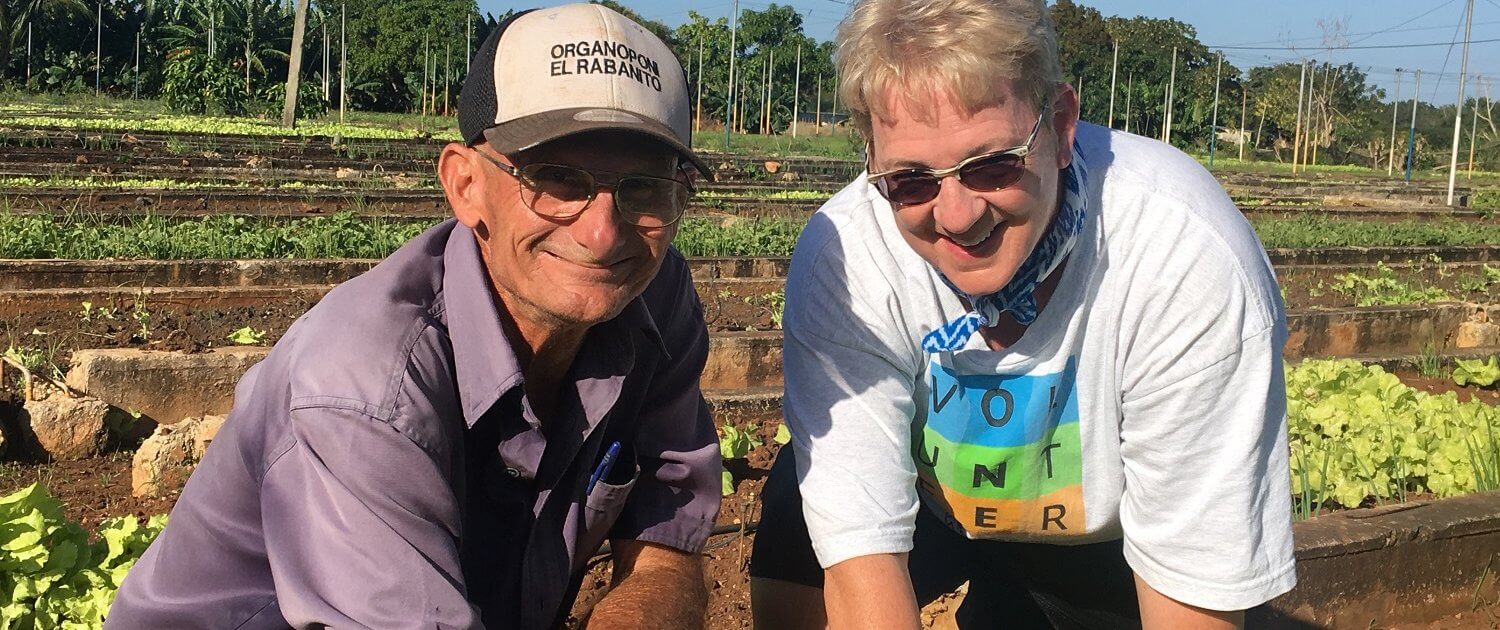
The Cuban government is ill-equipped to provide meaningful services and engagement to the high percentage of seniors in Havana. The Cuban Council of Churches helps by conducting programs for the elderly at church facilities, where volunteers converse in English, play games, offer physical therapy, and engage seniors in other ways as requested. Further, volunteers help women become self-reliant by helping sew, knit and crochet crafts, baby clothes, aprons, dresses, hats, purses, tablecloths and the like which are sold to benefit the women’s cooperative interests and to support local families.
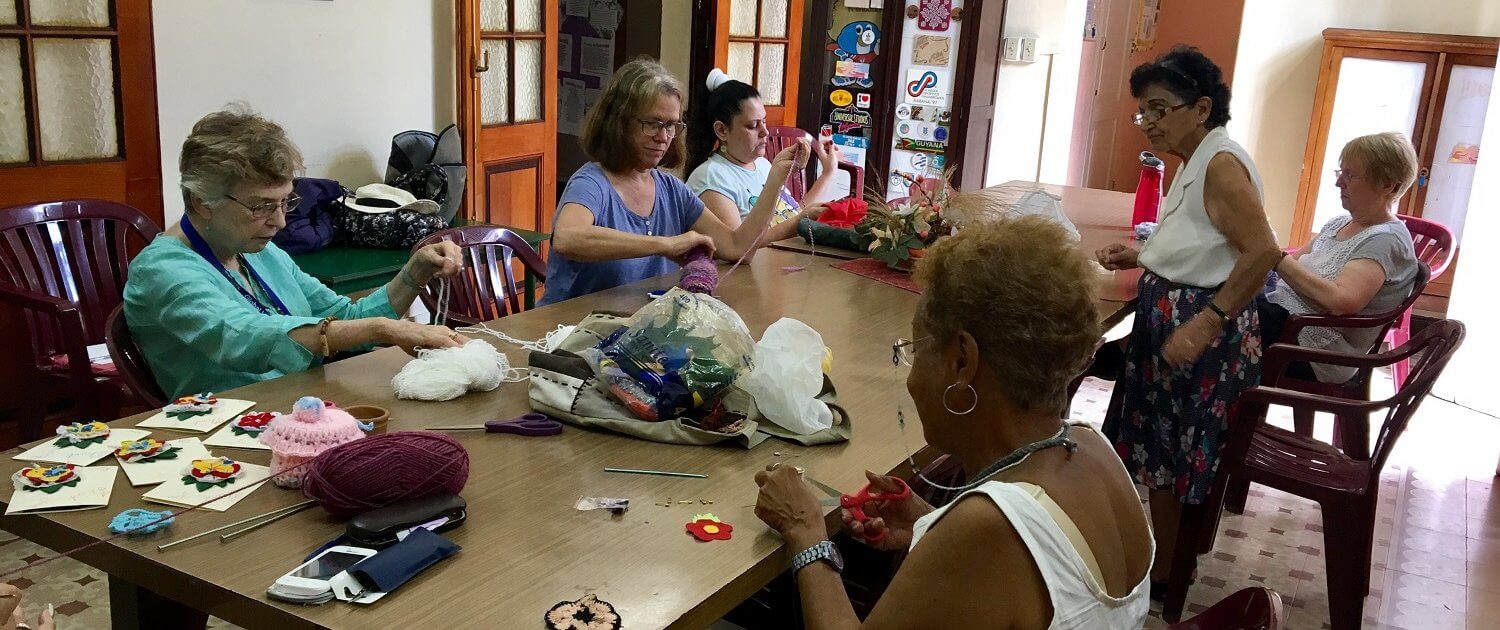
The purpose of volunteer support to the Cuban people through requested service projects is to lessen economic suffering, and cultivate mutual understanding and respect – replacing the suspicion and distrust between the U.S. and Cuban governments. The Cuban government launched key economic reforms in 2021, such as legalizing the creation of private small- and medium-sized enterprises, and expanding the range of commerce for independent actors. However, numerous restrictions on relations between U.S. and Cuban businesses remain in place. Volunteer service can help create a platform for respectful dialogue, and meanwhile assist people gain an advantage in their personal lives.

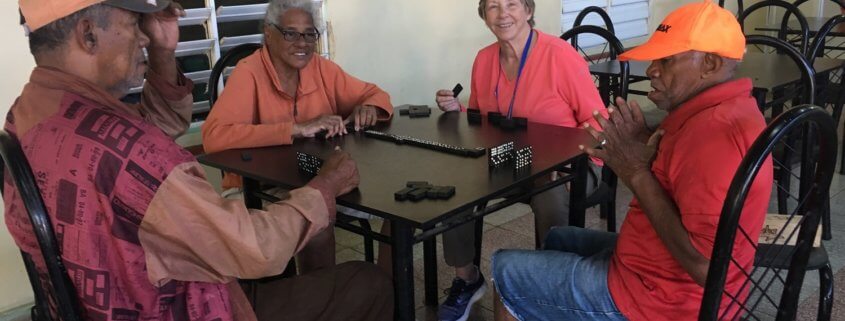


Leave a Reply
Want to join the discussion?Feel free to contribute!